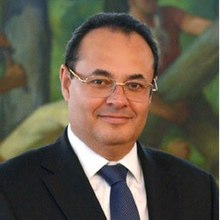Luis Carranza: Difference between revisions
No edit summary Tags: Mobile edit Mobile app edit Android app edit |
fix wikilinks to article name |
||
| Line 40: | Line 40: | ||
}} |
}} |
||
'''Luis Julián Martín Carranza Ugarte''' (born December 21, 1966) is a [[Peruvian]] economist, banker and academic. He served as [[Ministry of Economy and Finance (Peru)|Minister of Economy and Finance of Peru]] in the [[second presidency of Alan García]], from July 2006 to July 2008 and from January to December 2009.<ref>{{Cite web|url=https://www.mef.gob.pe/es/component/content/article?id=493:..|title=Ministerio de Economía y Finanzas - Histórico - Relación de Ministros|website=www.mef.gob.pe}}</ref> During his first tenure, he championed several structural economic reforms that proved extremely successful. Peru achieved their highest continued average growth rates in recent history (8% average), the FTA with the USA was signed, technology and productivity gains in the country were the highest ever in recorded Peruvian history (40% yearly increments in capital investment), and poverty dropped dramatically (from 52% to 34% of total population). He was re-appointed in January 2009, |
'''Luis Julián Martín Carranza Ugarte''' (born December 21, 1966) is a [[Peruvian]] economist, banker and academic. He served as [[Ministry of Economy and Finance (Peru)|Minister of Economy and Finance of Peru]] in the [[second presidency of Alan García]], from July 2006 to July 2008 and from January to December 2009.<ref>{{Cite web|url=https://www.mef.gob.pe/es/component/content/article?id=493:..|title=Ministerio de Economía y Finanzas - Histórico - Relación de Ministros|website=www.mef.gob.pe}}</ref> During his first tenure, he championed several structural economic reforms that proved extremely successful. Peru achieved their highest continued average growth rates in recent history (8% average), the FTA with the USA was signed, technology and productivity gains in the country were the highest ever in recorded Peruvian history (40% yearly increments in capital investment), and poverty dropped dramatically (from 52% to 34% of total population). He was re-appointed in January 2009, during the [[Great Recession]]. Before being appointed Minister, Carranza was [[BBVA]] chief economist for Latin American and emerging markets. |
||
==Education== |
==Education== |
||
Revision as of 08:58, 1 August 2024
Luis Carranza Ugarte | |
|---|---|
 | |
| Minister of Economy and Finance | |
| In office January 19, 2009 – December 22, 2009 | |
| President | Alan García |
| Prime Minister | Yehude Simon Javier Velásquez |
| Preceded by | Luis Valdivieso Montano |
| Succeeded by | Mercedes Aráoz |
| In office July 28, 2006 – July 14, 2008 | |
| President | Alan García |
| Prime Minister | Jorge Del Castillo |
| Preceded by | Fernando Zavala |
| Succeeded by | Luis Valdivieso Montano |
| Deputy Minister of Finance | |
| In office August 22, 2004 – August 17, 2005 | |
| President | Alejandro Toledo |
| Prime Minister | Carlos Ferrero |
| Minister | Pedro Pablo Kuczynski |
| Preceded by | Kurt Burneo |
| Succeeded by | Waldo Mendoza Bellido |
| Member of the Central Reserve Bank of Peru Board of Directors | |
| In office March 2, 2004 – January 25, 2006 | |
| Appointed by | Alejandro Toledo |
| Personal details | |
| Born | 21 December 1966 Lima, Peru |
| Political party | Independent |
| Alma mater | Pontifical Catholic University of Peru (BA) University of Minnesota (MA, PhD) |
| Occupation | Economist Banker |
Luis Julián Martín Carranza Ugarte (born December 21, 1966) is a Peruvian economist, banker and academic. He served as Minister of Economy and Finance of Peru in the second presidency of Alan García, from July 2006 to July 2008 and from January to December 2009.[1] During his first tenure, he championed several structural economic reforms that proved extremely successful. Peru achieved their highest continued average growth rates in recent history (8% average), the FTA with the USA was signed, technology and productivity gains in the country were the highest ever in recorded Peruvian history (40% yearly increments in capital investment), and poverty dropped dramatically (from 52% to 34% of total population). He was re-appointed in January 2009, during the Great Recession. Before being appointed Minister, Carranza was BBVA chief economist for Latin American and emerging markets.
Education
- PhD in economics, University of Minnesota
- MA in economics, University of Minnesota
- Licenciature in Economics, Pontificia Universidad Católica del Perú
- BA in economics, Pontificia Universidad Católica del Perú
Other activities
- Visiting professor, Master in Economics and Finance program, Faculty of Economic and Business Sciences, University of Navarra
- Consultant, Inter-American Development Bank
Past Public Service
- Member, Board of Directors, Central Reserve Bank of Peru
- Deputy Minister of Finance, Government of Peru
References
- ^ "Ministerio de Economía y Finanzas - Histórico - Relación de Ministros". www.mef.gob.pe.
